Entrepreneurship educations has over the latest 15 to 20 years expanded from a business school topic to be a relevant for all educations in Higher Education. Some key arguments are: development of students’ ability to crate value, taking and handling risk, and students’ ability to act – also in an uncertain future.
“Entrepreneurship education is important as a crucial determinant of the supply of entrepreneurship by forming (potential) entrepreneurs as well as contributing to a positive entrepreneurship culture. In this respect, entrepreneurship education should not only focus on narrow defined tools (e.g. how to start up a business, financial and human resources management) but also to broader attitudes (like creativity, risk taking, etc.) especially on the lower and secondary level”(OECD, 2008, p.112)”. As discussed below the recent focus on students’ development of entrepreneurial competences broadens the entrepreneurial teaching in universities.
One way to categorize Entrepreneurial education or entrepreneurship in (Higher) education in the following three categories
for = learning to become an entrepreneur: here, the emphasis is on the abilities and skills required to implement an idea and launch a business;
through = learning to become entrepreneurial: the main objective is to strengthen the “entrepreneurial mindset” (capacities), i.e. the general disposition that enables someone to “launch an enterprise”;
about = learning to understand entrepreneurship: these learning activities are intended to help students develop an understanding for companies, with a focus on establishing correlations (relevant knowledge).”
(frit efter Lindner 2018)
a historical review by nicolai nybye
This is an extract from
Nicolai Nybye, Ph.d. dissetation, Et flertydigt entreprenørskabsbegreb i professionsuddannelser – Mellem åbenlys og skjult meningsskabelse. Februar 2020.
Chapter 4: Review – Entrepreneurskab som del af videregående uddannelser (in danish) (lagt op hermed Samtykke fra Nicolai Nybye)
Entrepreneurial competences
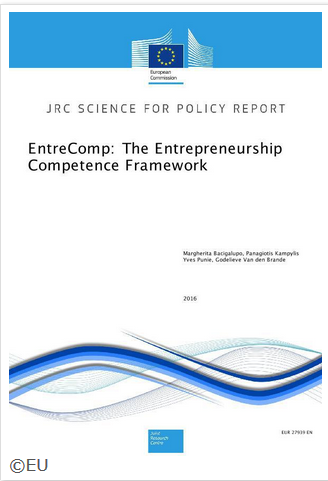
Link to report
The framework develops the 15 competences along an 8-level progression model and proposes a comprehensive list of 442 learning outcomes. The framework can be used as a basis for the development of curricula and learning activities fostering entrepreneurship as a competence. Also, it can be used for the definition of parameters to assess learners’ and citizens’ entrepreneurial competences.
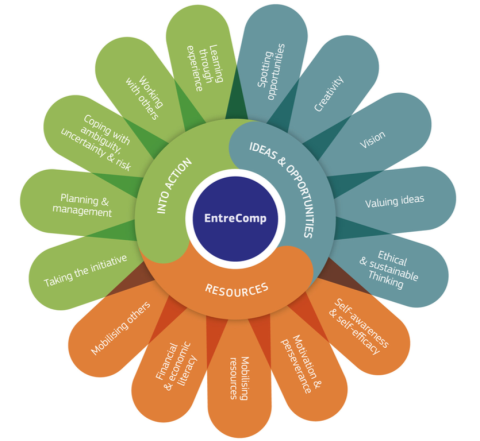
The Entrecomp report above contains among other useful outputs “the Entrecomp Wheel”
Siwan Mitchelmore and Jennifer Rowley (2010). Entrepreneurial competencies: a literature review and development agenda. IJEBR 16,2
This article contains quite extensive lists of competences.
There are several bids on 21st century skills. Here is one example:
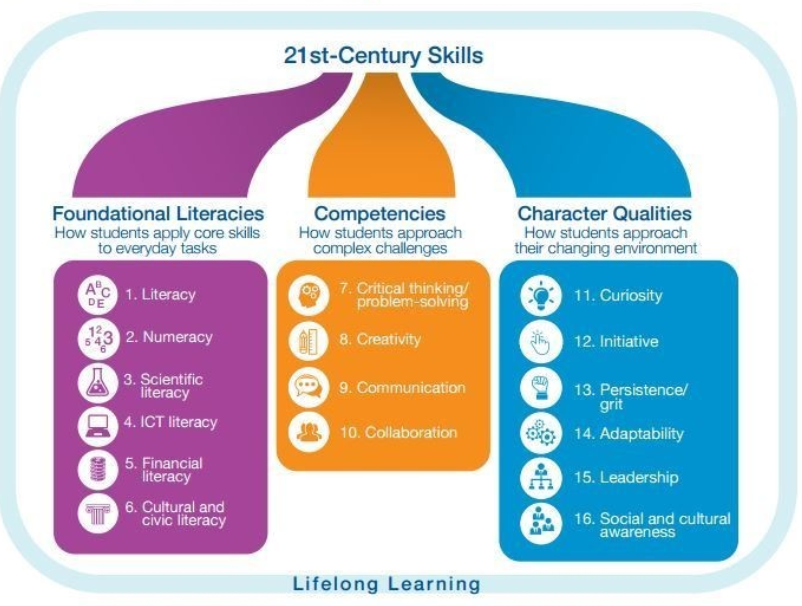
21st century skills,
entrepreneurial mindset
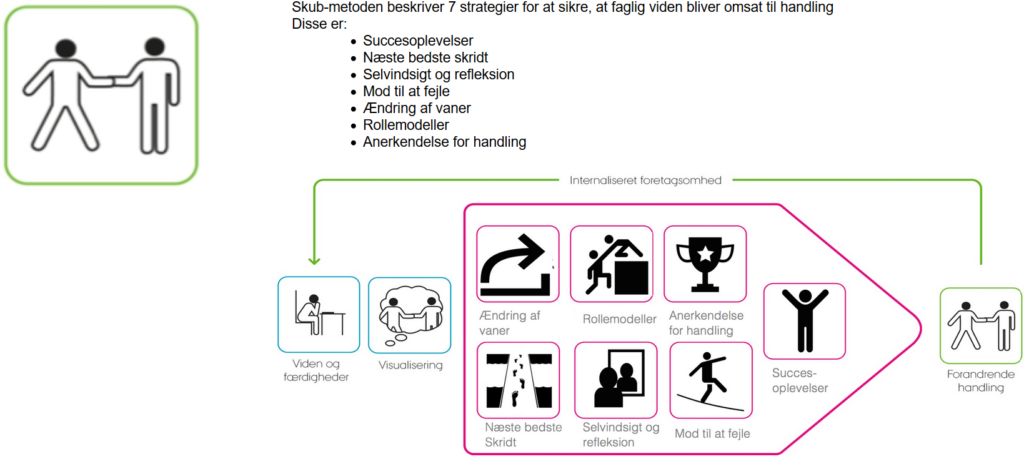
The Skub-method by Kirketerp is a good example of teaching method aiming at building students personal action competence. (Link)
Kategorisering af I&E undervisning
Det kan være rart at have nogle kategorier for I&E undervisning. Det vil lette tankerne i forhold til hvordan en implementering og en implementeringsstrategi kan se ud.
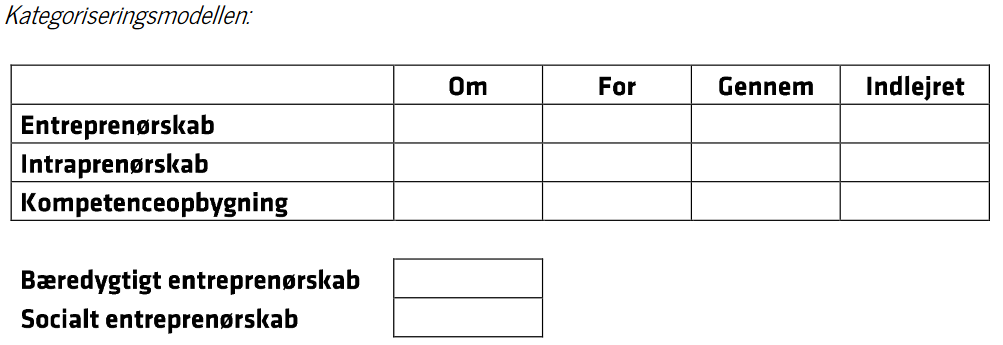
Intraprenørskab i undervisningen

Literature
This list of literature is an extract from a very large field.
The sources mentioned is estimated valuable for the lecturer in Higher Education.
Lindner, J. (2018). Entrepreneurship Education for a Sustainable Future. Discourse and Communication for Sustainable Education,
vol. 9, no. 1, pp. 115-127, 2018
This article unfolds the about, for, and through in a context of teaching for sustainalibity
Morselli, D. (2018). Teaching a sense of initiative and entrepreneurship with constructive alignment in tertiary non-business contexts. Education & Training, 60(2), 122-138. doi:http://dx.doi.org/10.1108/ET-06-2017-0093
Suna Løwe Nielsen, (2014) Entreprenørskab i teori og praksis, paradokser i spil. 2014, 2. udgave, Syddansk Universitetsforlag, 256 sider
Bogens målgruppe er studerende, men bestemt også inspirerende læsning for især den nye underviser på feltet. Bogen tager endvidere fat i forskelle på entreprenørskab og intraprenørskab.
Nicolai Nybye, (2020) Et flertydigt entreprenørskabsbegreb i professionsuddannelser, – mellem åbenlys og skjult meningsskabelse, Ph.d.-afhandling, 283 sider
Afhandlingen rummer bl.a. to meget spændende reviews. Kapitel 3 om et heterogent entreprenørskabsbegreb samt Kapitel 4 om entreprenørskab som en del af videregående uddanneler. (Afhandlingen er på dansk.)
Kari Kleine, Ferran Giones, Mauricio Camargo and Silke Tegtmeier (2018) Building technology entrepreneurship capabilities: an engineering education perspective.
Kari Kleine, Ferran Giones and Silke Tegtmeier (2019) The Learning Process in Technology Entrepreneurship Education – Insights from an Engineering Degree. Journal of Small Business Management 2019, 57(S1), pp 94-110
Kari Kleine, (2020) Technology Entrepreneurship, Enriching Entrepreneurship Education. doi.org/10.1007/978-981-13-2262-4_172-1
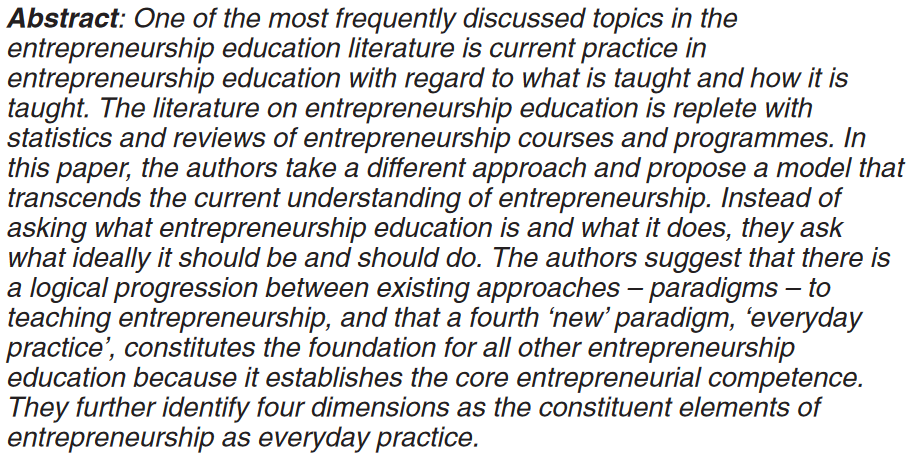
Blenker Per, Korsgaard S, Neergaard H, Thrane C. The Questions We Care About: Paradigms and Progression in Entrepreneurship Education. Industry and Higher Education. 2011;25(6):417-427. doi:10.5367/ihe.2011.0065
Anne Linstad Kirketerp (2010) Pædagogik og didaktik i entreprenørskabsundervisningen på de videregående uddannelser i et foretagsomhedsperspektiv. Syddansk Universitet, Syddansk Universitetsforlag, 2010. 387 sider
Afhandlingen diskuterer bl.a. hvordan vi kan uddanne til personligt mod til fortagsomhed hos studerende.
Britt Due Tiemensma and Connie Stendal Rasmussen University College Absalon,(2019) Entrepreneurship Education in a Democratic Perspective in Discourse and Communication for Sustainable Education, vol. 10, no. 2, pp. 100-111, 2019
Extract from abstract: “Based on a model from the Danish Foundation for Entrepreneurship and theories on democratic formation and active citizenship, the authors analyze what entrepreneurship and democratic formation have in common. Entrepreneurship education will also be linked to education for sustainable development.”
OECD (2009), “Evaluation of Programmes Concerning Education for Entrepreneurship”, report by the OECD Working Party on SMEs and Entrepreneurship, OECD. (link)
